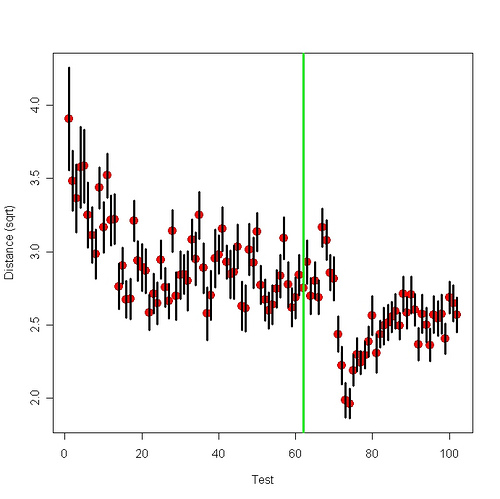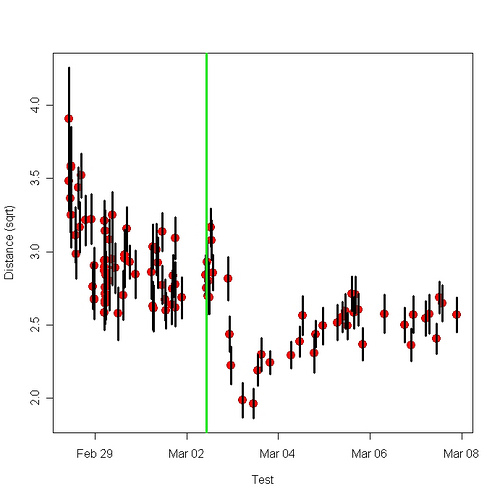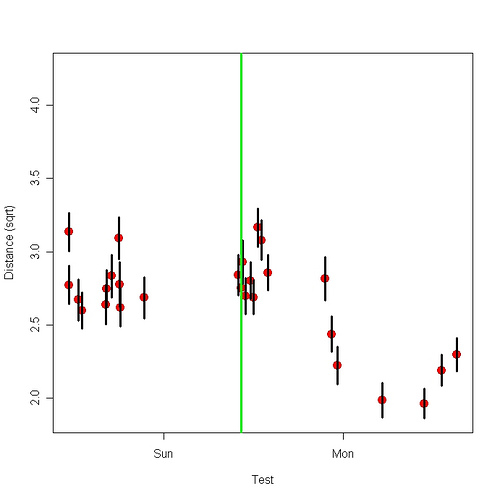The more I played racquetball, the more accurate my shots became — the more control I had. It was a kind of learning: learning to place the ball. I was fascinated by how little we knew about how that learning took place. I studied associative learning in my own research. The motor learning during racquetball resembled associative learning in the sense that my actions (hitting the ball with the racket) were shaped by what happened next (accuracy of placement). Yet I knew nothing non-obvious about motor learning.
This background of ignorance is why I find my latest flaxseed oil results so interesting. As I’ve posted, I’ve started using a new test in which I use the touchpad to “toss” the cursor from one spot to another (that is, move the cursor with a single finger movement), and measure how close it “lands” to the target. The function relating cursor position to finger position on the touchpad isn’t simple.
Of course I wanted to see how flaxseed oil affected performance on this task. I doubted that it would. This task is untimed. No time pressure. It is like shooting free throws. Most of the previous tasks I’ve used that have shown a flaxseed-oil effect have been tasks where you respond as fast as possible. My balance test was go at your own pace, but it involved a huge amount of computation. Balancing my body on one foot for several seconds seemed to involve a lot more computation than moving a finger about an inch.
Usually I take 4 tablespoons of flaxseed oil just before bedtime. One recent day I took it much earlier and did the toss test at 30-minute intervals before and for several hours afterward.
Here are the results plotted as a function of test session number.

Here are the same results plotted versus the time of the test:

Here is a close-up of the crucial data:

About two hours after I drank the flaxseed oil, my accuracy got worse. Then it slowly got much better. The amazing thing about the improvement is that it reached a maximum long after you would think that the effects of the flaxseed oil had worn off. My overall level of omega-3 is high because I take 4 T flaxseed oil per day. The effect of shifting when I drink the 4 T is just to change the timing of a short-lived peak. Usually that peak happens when I’m asleep and my omega-3 levels are reasonably constant while I’m doing the test. In this case the peak happened while I was doing the test.
I’ll discuss what this might mean in a later post.
Have you ever compared what type of omega-3′s work best? I mean, the whole ALA vs. DHA vs. EPA thing. I’ve heard that what people really need is DHA and EPA, and that not everybody can convert ALA to those other forms in their bodies. Personally, my gums have been staying pretty healthy after I switched from taking an ounce of flaxseed oil to taking a few “Fisol” capsules that had about the same amount of DHA and EPA as the ounce of flaxseed oil. And it’s a lot easier to take the capsules. I’m curious, though, what findings you might have.
I once took some fish oil and got a headache. Flaxseed oil has never given me a headache. In any case, I’m still working out the phenomenology of flaxseed oil. Later I’ll try different oils, including fish oil.
No doubt you’ve seen this, but if not is hip-slapping-amusing.
“… supply of long-chain polyunsaturated fatty acids that are essential for neurodevelopment. Thus, waist-hip ratio (WHR), a useful proxy for the ratio of upper-body fat to lower-body fat, should predict cognitive ability in women and their offspring. Moreover, because teenage mothers and their children compete for these resources, their cognitive development should be compromised, but less so for mothers with lower WHRs. …”
— https://www.ehbonline.org/article/S1090-5138(07)00073-6/abstract
soukous
Seth:
I am not sure I am reading your x-axis right, but isn’t there a “correlation” between taking omega-3 + sleep and improvement ?
It reminds me of this entry in my blog:
https://nuit-blanche.blogspot.com/2005/01/we-sleep-because-we-want-to-assimilate.html
which talks about experiments performed by Daniel Wolpert on sensorimotor learning that seem to parallel bayesian statistics (the last Paragraph). The sleep issue appears in small print in the nature paper (study done over two days)
https://www.hera.ucl.ac.uk/sml/publications/papers/KorWol04.pdf
But I think I read the more complete report which showed that learning after the first day was not optimal but was better when people had slept on it.
Btw, It is interesting that some of his experiments (https://learning.eng.cam.ac.uk/wolpert/projects/index.html) look like what you are talking about in your blog (about boredom and games…)
The Nature paper is:
https://www.hera.ucl.ac.uk/sml/publications/papers/KorWol04.pdf
Igor.
I read somewhere that the carbon chains in the fatty acids from flaxseed oil are too short and while the body does synthesize the longer chains the process is very inefficient, meaning that flaxseed oil must be taken in huge quantities. On the other hand, fish oil provides long chain fatty acids. I’m veggie, so I’m taking algal omega-3 oil from v-pure.
Hi Seth,
Vastly enjoyed your presentation today and had a million questions. Three of them are:
(i) do you know anything about side effects of flaxseed oil?
(ii)interactions of flaxseed oil with other supplements? Other drugs?
(iii) which other oils offer the same amount of Omega-3? Grapeseed oil? fish oils?
(iv) you said that it was cheaper to buy in liquid form. Where (if there is no Whole Foods nearby)?
Best,
H
1. The only important possibly negative side effect of flaxseed oil seems to be a lengthening of clotting times. Fish oil has the same effect.
2. An average doctor would say that flaxseed oil “interacts” with medication designed to reduce clotting times.
3. No other readily-available oils offer the same amount of short-chain omega-3. Fish oil has lots of long-chain omega-3.
4. The Spectrum Organic website has a way to locate stores that sell their stuff. Barlean’s is another widely available brand. Trader Joe’s has an inferior version (with lignans, which are a useless complication).
It seems flaxseed oil is becoming more and more popular. I myself have not tried it however I have taken Omega 3 supplements, specifically the one from Neurovi.com, for a while because of the effects I’ve read about it improving brain function. I also took it when I was pregnant and had no problems at all.
One thing I do see in article after article is the importance of the DHA to EPA ratio when taking these supplements. The one I’m taking now seems to meet those standards ideally so I am happy. Thanks for your very interesting article!!